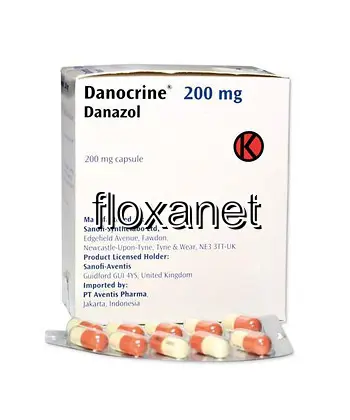| Package | Dosage | Price | Price per Dose | |
|---|---|---|---|---|
| Dosage: 50mg | ||||
| 360 pill | 50mg | £467.07 | £1.30 | |
| 180 pill | 50mg | £235.59 | £1.31 | |
| 120 pill | 50mg | £158.43 | £1.32 | |
| 90 pill | 50mg | £121.39 | £1.35 | |
| 60 pill | 50mg | £83.32 | £1.39 | |
| 30 pill | 50mg | £44.23 | £1.48 | |
| Dosage: 100mg | ||||
| 180 pill | 100mg | £481.47 | £2.67 | |
| 120 pill | 100mg | £325.09 | £2.71 | |
| 90 pill | 100mg | £245.87 | £2.73 | |
| 60 pill | 100mg | £165.63 | £2.76 | |
| 30 pill | 100mg | £84.35 | £2.80 | |
| Dosage: 200mg | ||||
| 120 pill | 200mg | £425.91 | £3.55 | |
| 90 pill | 200mg | £324.06 | £3.60 | |
| 60 pill | 200mg | £234.56 | £3.91 | |
| 30 pill | 200mg | £121.39 | £4.03 | |

Danazol Description
Overview of Danazol
Danazol is a synthetic steroid derived from the hormone testosterone. It is primarily used to treat a variety of medical conditions related to hormonal imbalance and immune system disorders. This medication works by modifying the body's hormonal activity, helping to regulate functions that are out of balance. It is available under various brand names and can be prescribed by healthcare professionals after thorough evaluation.
Uses and Indications
Danazol is commonly prescribed for the treatment of endometriosis, a condition where tissue similar to the uterine lining grows outside the uterus, causing pain and other complications. It helps reduce the symptoms by suppressing ovarian function and decreasing hormonal levels that stimulate the growth of endometrial tissue. Additionally, danazol is used to manage hereditary angioedema, a genetic disorder characterized by recurrent swelling in various parts of the body. By inhibiting certain immune responses, it helps prevent or reduce the frequency and severity of angioedema attacks. In some cases, danazol may also be used for breast tissue disorders or to stimulate certain blood cell counts, but these uses are less common and should be closely monitored by a healthcare provider.
How Danazol Works
This medication exerts its effects by creating a negative feedback mechanism on the hypothalamic-pituitary-gonadal axis. Essentially, it decreases the production of hormones like luteinizing hormone (LH) and follicle-stimulating hormone (FSH). This suppression leads to reduced estrogen and progesterone levels, which can be beneficial in conditions like endometriosis where hormone-driven tissue growth causes discomfort. It also reduces the immune system activity linked to hereditary angioedema. Due to its hormonal activity, danazol influences many body functions and requires careful dosage control to minimize side effects.
Side Effects and Precautions
While danazol can be effective in managing specific conditions, it also carries the risk of side effects. Common adverse effects include weight gain, acne, changes in menstrual cycles, hot flashes, and increased hair growth. More serious but less common effects involve liver toxicity, changes in cholesterol levels, and mood alterations. Because of its hormonal activity, long-term use can potentially lead to hormonal imbalances, bone density reduction, or liver problems.
Women who are pregnant, breastfeeding, or planning to conceive should not use danazol, as it can harm the fetus or interfere with fertility. Patients with liver disease, breast cancer, or hyperlipidemia should inform their doctor before starting this medication. Regular monitoring through blood tests and clinical assessments is essential during therapy to detect any adverse effects early and adjust the dosage accordingly.
Dosage and Administration
The prescribed dosage of danazol can vary depending on the condition being treated, the patient's response, and body weight. It is usually taken in the form of capsules or tablets once or twice daily. Patients are advised to follow their healthcare provider's instructions carefully, not to alter the dose without consultation, and to complete the full course of treatment. It is important to take the medication with food or milk to reduce stomach upset and to maintain consistent timing for optimal results.
Conclusion
Danazol is a potent medication with specific uses in hormonal and immune-related disorders. Its effectiveness has been documented over years of clinical use, particularly in endometriosis and hereditary angioedema. However, its hormonal effects necessitate cautious use and close medical supervision. Patients should discuss the potential benefits and risks with their healthcare provider and adhere strictly to prescribed guidelines. While it can significantly improve quality of life for those with certain conditions, understanding its profile ensures safe and effective treatment.
